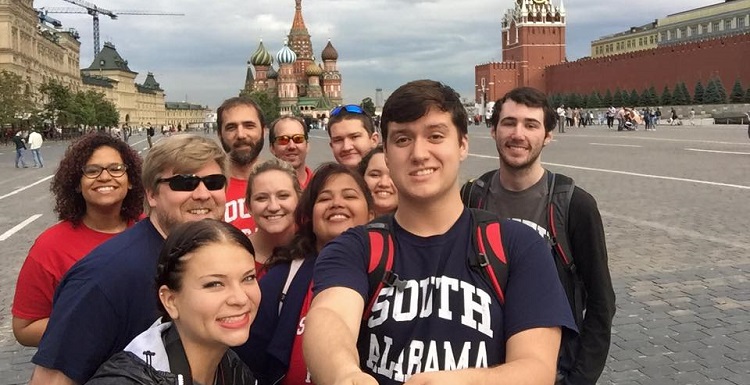South Recognized for Global Engagement
Posted on October 24, 2016

At first glance, an advertising operations associate for Politico magazine and a former au pair in Sweden who recently joined AmeriCorps might appear to have as little in common as an English teacher in Cartagena, Colombia, and a future human resources benefits manager.
In reality, these are just four examples of hundreds of University of South Alabama students whose horizons – and resumes – have been broadened as part of a concerted, holistic effort to enhance and increase international experiences at South.
South’s focus on global engagement was recognized Monday, Oct. 24, at the Institute of International Education’s (IIE) Generation Study Abroad Summit in Washington, D.C., where Holly Hudson, USA’s director of international education, accepted a Certificate of Excellence in the Field of Study Abroad.
The honor places USA among only 12 colleges and universities, out of more than 400 participants, to fulfill their individual commitments – in less than two years – toward doubling the number of American students studying abroad by the end of the decade.
“I think we will definitely achieve our goal by 2020 if not sooner. The support of the administration has been very helpful, and our students are really dedicated and committed to this,” said Hudson, calling the participating students – many of whom are first-generation students – “encouraging and inspiring.”
“A lot of our students don’t have much in the way of extra resources, but they are some of the most determined and hard-working students you will ever meet, and when they decide to do something, they push themselves and find ways to make it happen,” Hudson said.
Samantha Borden, 20, of Mobile is a junior majoring in business management with a concentration in human resources. She is what Hudson considers a “model” ambassador for the program.
Borden, who returned recently from her first summer abroad, took part in a faculty-led international marketing program in San Jose, Costa Rica, and is already planning her summer 2017 trek to England, France, Belgium, Germany and the Czech Republic, where macroeconomics will be her focus.
“My first time out, I wanted to baby-step it, to find out how I’d handle (being abroad). What I’ve learned is that even though I’m the type who is always going to be happy to get home, I can definitely go away and experience new and exciting things,” Borden said. “This time, I decided to go big or go home, and I’ll come back with all of these new perspectives, and I can do it all in one summer.”
Strength in numbers
When USA joined IIE’s Generation Study Abroad initiative, the goal was to double student participation in the study aboard program. USA sent 63 students abroad in 2013-14, so the initial target was set at 150. USA reached that goal, and then saw increases to 180 and, finally, 220 students in 2015-16. As a result, Hudson said USA has adjusted its 2020 goal to an ambitious 280 students which, if achieved, will account for a more than fourfold increase in only seven years.
The University previously hosted only one true exchange program, whereby USA students pay their tuition at South but study at an international institution for a semester or a year. Today, there are 10 such exchange programs.
“Students are bringing international experience back to our departments, and then students from those environments are becoming part of our classrooms, which enriches our discussions and the learning experience,” Hudson said.
Among the newest exchange programs is one spearheaded by Dr. John Steadman, dean of USA’s College of Engineering, who traveled to Germany to explore a consortium of German universities with whom research collaboration is a possibility. As a result, 10 engineering students – who traditionally find it more difficult to find study abroad opportunities – have applied for a summer 2017 exchange program. And while only three of the applicants can be selected, Hudson said efforts are being made to find meaningful opportunities for the remaining seven.
Meanwhile, USA’s number of faculty-led study abroad programs has grown from only one or two to 13.
Hudson said what she finds most encouraging about the surge in faculty-led efforts is the breadth of programs and disciplines they now represent, as compared with the primarily language-based focus in years past. For instance, two years ago the only non-language-based offering for USA study abroad students was a visual arts program in Spain. Today, the faculty-led programs available or in development range from business and anthropology to life science, engineering and even audiology.
Among these programs, Hudson cited two examples where the efforts are already encouraging collaboration with other regional institutions.
The Mitchell College of Business took students to France for its first outing this past summer, melding aspects of international business, marketing and management. At the same time, the hospitality and tourism management program is planning an overseas trip in Summer 2017 with culinary arts students from Faulkner State Community College as part of the entourage.
New programs
In addition to the enhanced commitment to USA’s study abroad programs and scholarships, the University also is working to increase the number of international students attending USA, improve student access to international travel and increase multicultural programming and events.
Hudson said USA already supports “upwards of 1,000” international students and several hundred international scholars, and she expects those figures to increase rapidly. She pointed specifically to two new initiatives: the development of a Global Engagement Certificate and the launch of the International Education Ambassadors program.
The certificate, for which advising is expected to launch in the spring of 2017, is a first step toward “internationalizing” USA’s curriculum in a way that allows students to stand out to potential employers or graduate schools, she said.
“It’s offering them a credential and adding value to their undergraduate degree by providing opportunities to engage via 17 hours of approved courses and nine hours of approved activities, of which the latter can be achieved through study abroad, internships, leadership roles among intercultural groups on campus and even participating in English as a Second Language speech partner programs,” Hudson said. “We’ve taken a preliminary look at the curriculum at all colleges and identified courses that would meet the requirement for these globally-focused courses or internationally-focused courses. Students could essentially – if they’re strategic in their advisement – complete this certificate without taking additional courses.”
The International Education Ambassador program, meanwhile, offers students a peer-driven support system both in preparation for study abroad opportunities and re-assimilation upon return.
“It allows them to continue to tell their stories, and it’s a way for students to connect with one another – in ways faculty and staff just can’t – about these life-changing experiences,” Hudson said.





